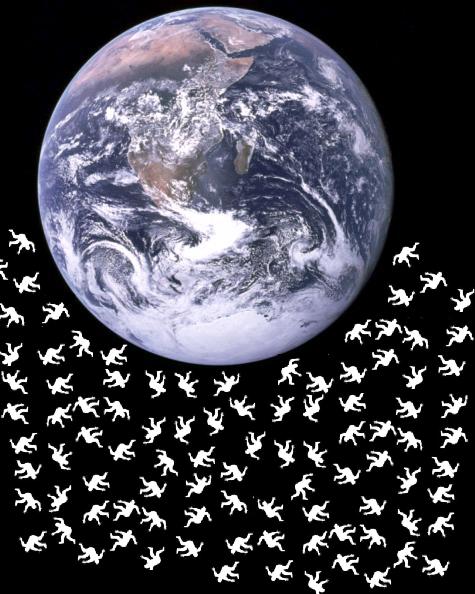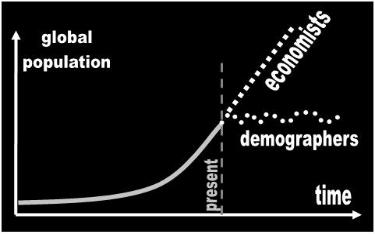There are two currents in the 'demo-econ' establishment, one more idiotic than the other, you take your pick.
The demographers or ecologists admire 19th Century pioneer Thomas Malthus, who predicted that geometric
population growth would eventually outpace food production and result in widespread starvation.
Contemporary Malthusians argue that in addition to starvation, unchecked demographic expansion results
in a deterioration of the environment, pollution, climate change, and overcrowding. They advocate solutions
such as emissions reduction, one child per family, reduced or interrupted immigration, habitat and energy
conservation. What Malthusians have in common is an unreasonable concern for the future -- specifically the
continuation of the human race -- and about leaving a pristine garden for the next generation. A Malthusian
always begins his presentation by showing that population expands exponentially unless proactively
suppressed, next shows that we are already too numerous, and ends with a call to action. I will refer to
Malthusians as the demographers.
The other half of the establishment consists of even bigger idiots which I will refer to as the economists. The
economist is an individual who doesn't see any problem at all and wonders what the Malthusian chicken-littles
are all excited about. These morons usually raise two arguments: 1. Malthusian predictions have always failed
to materialize and 2. that the reason for this is that technology keeps pace with population. Therefore, whereas
a demographer desires for population to level off eventually and be more or less constant forevermore, the
economist sees no problem with and in fact hopes for a perpetually increasing population:
- " We have in our hands now—actually in our libraries—the technology to feed,
clothe, and supply energy to an ever-growing population for the next 7 billion
years." [1]
| P. Ehrlich, The Population Bomb, Ballantine (1969). J. Bongaarts, Beyond Six Billion, National Academy Press (2000). D. Coutts, 6 Billion - The Game Of The New Millennium (2007). |
| Humans will overflow the planet |
| Adapted for the Internet from: Why God Doesn't Exist |
Fig. 1 Demographers vs. economists |
| A demographer is an idiot who believes or hopes that the population of Earth will stabilize this century and remain more or less constant for the rest of eternity. An economist is a bigger idiot who sees no problem with population growth because humans develop technology to overcome any obstacles. A demographer is concerned about ecology. An economist emphasizes technological progress. |
Coutts is a Malthusian at heart. He is a disciple of Ehrlich and an ally of Bongaarts. In his elaborate website
he makes a seemingly strong case for ecology and the environment. Coutts argues first that Zero Population
Growth (ZPG) is a myth. All species, including Man, grow exponentially unless one of the four horses of the
Apocalypse (War, Famine,Pestilence, or Death) cuts them down. In the particular case of our species, he
believes that we have in addition voluntary and compulsive abstention. The reason Coutts doesn't believe
that ZPG is realistic is because scientific and technological advancements stimulate rather than curtail
demographic growth. More inventions and more efficiency only helps us sustain more people, a void we fill
by breeding more children. Like Ehrlich before him and Brown at his Worldwatch Institute, Coutts sounds
the alarms that we are reproducing like rabbits. He doesn't see any limit in sight, and believes that Zero
Population Growth has no chance of materializing. He claims that if we don't do something quickly, it may
mean the end of Man. Is his argument reasonable?
It is extremely easy to debunk Coutts's argument because his two claims are mutually exclusive. If ZPG is a
myth, it means that never will Man attain a maximum. We will just continue to increase until people start falling
off the planet. If, instead, this process leads to extinction, then population will necessarily come to a stop at a
maximum point known as ZPG when it begins its descent. Therefore, either we will expand forever or ZPG is a
myth. Coutts cannot have it both ways.
But this is a superficial argument. I raise it merely to illustrate that Coutts has not thought about his proposal
very carefully. It is such sloppy formulation that later leads doomslayers to chase after strawmen.
A much more important objection to Coutts is that he shows a total disregard for the S-Curve, or perhaps he
just doesn't understand it. Certainly, he has never heard of density dependent birth rates. He should study
this law carefully and then erase his website if he wants to avoid embarrassing himself in public. Density
dependent birth rates are responsible today for our current asymptotic growth. They will necessarily take the
population of Man to ZPG whether Coutts likes it or not.
And now the doomslayers are right. We have the technology to feed trillions, so certainly we have the means
to feed a few billion stuck at ZPG.
However, they miss the point as well. The problem is not whether we have the technology to feed millions.
The problem is that we are becoming an urban species and this is the reason population is leveling off.
When the population levels off, demand comes to a stop. When there is no demand there are no profits and
companies close their doors, which means that there is even more unemployment and less demand.
Therefore, the crucial questions are:
- " Where will the proletarian work once the service economy collapses?"
" How will he feed himself?"
- Those are the only two questions an economist needs to answer. Man's artificial economy was never meant
to run on anything except exponential demographic growth.
As a side issue, Coutts also describes himself as an atheist:
- " I am a humanist, an atheist, amateur mathematician and amateur evolutionist." [1]
" atheism: as a philosophical view, is the position that... affirms the nonexistence
of gods... When defined more broadly, atheism is the absence of belief in deities...
Many self-described atheists... cite a lack of empirical evidence for the existence
of deities." [2]
This means that he needs to review the definition of exist as well.

| runaway sin |

- Module main page: Of catastrophists and doomslayers: Is Man going to live forever?
Pages in this module:
- 1. Carter, Leslie, and Gott: The Doomsday Argument
2. This page: Ehrlich, Bongaarts, and Coutts: Humans will overflow the planet
3. Hanson: We are running out of fuel
- ________________________________________________________________________________________
- Copyright © by Nila Gaede 2008